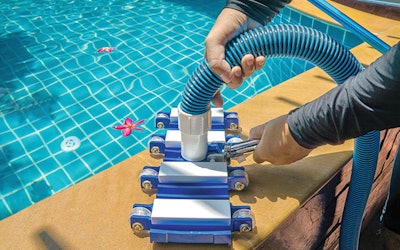
I want to tell you about something I find myself running into quite a bit, and from talking with fellow pros, I know you are too.
Many of us offer free estimates for weekly pool service. For service techs, especially small operations like mine, estimates are an important part of day-to-day business for several reasons: it’s a low pressure way for a customer to meet you, it gives you a captive audience for pitching your services and in general, doing business face-to-face is far more effective than texts or emails.
Then you hear it. “Hey, I’m having problems hooking up my pool cleaner, can you take a look?” “My pump is making a weird noise, can you check it out quick?” Before you know it, your estimate has turned into a full-blown service call that you’re not getting paid for.
When someone asks for help, it’s tempting to say, “Sure, I’ll take a look.” We think we’re being polite, and who knows, helping may win them over as a customer.
But think about it this way: the time you spend looking at “a little issue” is time you’re not earning money. It’s time taken away from your actual paying customers. In general, it’s a gamble — you may win the customer by taking the time to help out, but you also might not! And that’s time you can’t get back.
RELATED: The 12 Kinds of Customers Every Service Tech Meets
When you have an estimate and you can sense the conversation is shifting toward free work, you have to stand up for yourself.
I went out for an estimate a few weeks ago and encountered this very situation. I go in anticipating a routine estimate, and I’m about to give him my elevator pitch when he says, “My automation’s not working for me, can you fix it?”
The tone of the conversation shifts. Now he’s rattling off all the issues he’s having with his automation. And as we all know, an automation issue can be as simple as rebooting the system or as complex as diagnosing an error message.
This is a turning point. I can either gamble my time and see if the problem is easily fixed, or I can stand up for myself.
So I interrupt him. “Sir, I’m actually here today to earn your business for weekly pool service. I’d be happy to help you with your automation problem, but that’s something I would have to charge for as a service call.”
For a moment, dead air. The homeowner was a bit taken aback, but then he understood and even apologized. It was like I could see him working through things in his head and realizing that his “simple” request was actually an imposition on my time. He realized that I’m running a business and time is money — and if he needs help, he has to pay for it.
While it’s important to be professional and courteous, it’s also important to establish boundaries with your customers from the very first visit. Because if they’re ultimately looking to get your time and knowledge for free, you don’t want them as a client anyway.












































